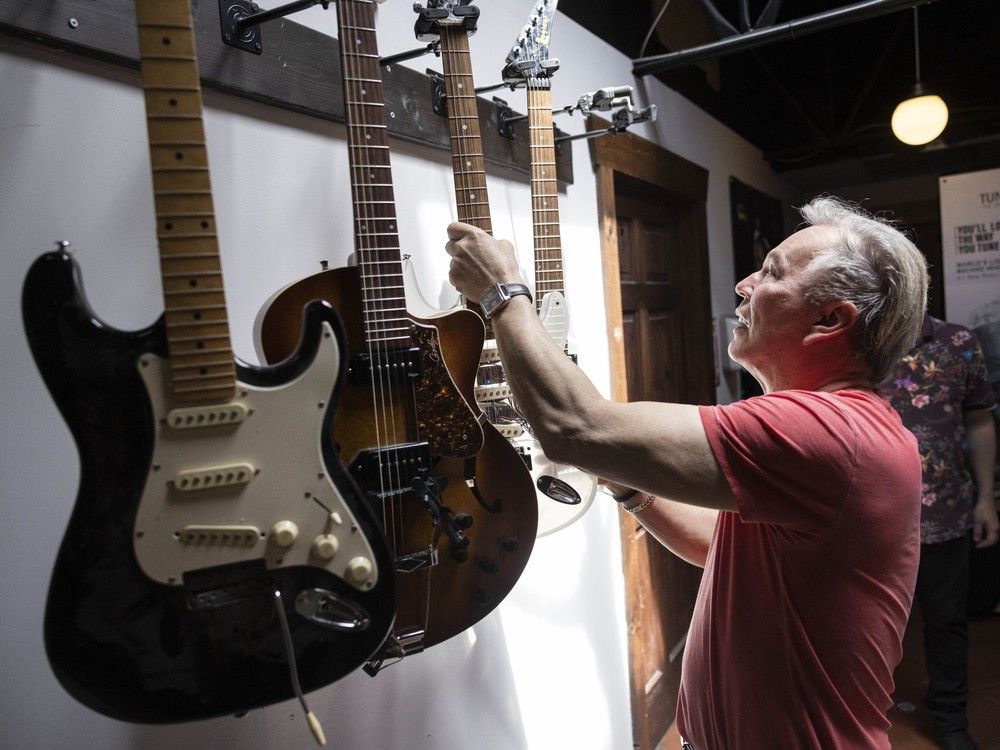
Forty-three years ago Dave Dunnwoodie began tinkering with the bits of electric guitars, finding innovative ways to solve age-old problems, such as strings binding on traditional guitar nuts.
Nuts are a small grooved material, usually bone, graphite or plastic, that sit at the top of a guitar neck and which holds the strings in place.
But during an early-80s guitar solo during a gig at some Vancouver club that long ago disappeared into the fog of memory, Dunwoodie hit the tremolo bar and the strings started gumming up right away.
“I went to do my first ‘wang’ and went totally out of tune,” he remembers.
Knowledge in the pre-internet days was harder to come by, but Dunwoodie was determined to, as it were, build a better mousetrap for the guitar.
Working at his kitchen table in a small back-lane rental suite in Richmond, he came up with a substance — the recipe of which is as closely guarded a secret as Colonel Sanders’ 11 herbs and spices, or Coca-Cola’s formula — for a self-lubricating nut that today is 200 per cent more slippery than the standard lubricant of the time, graphite (pencil lead).
For 15 years or so, he worked on Graph Tech during the day and played in bands at night to make ends meet.
His then-new company, Graph Tech Guitar Labs, earned $18,000 in sales that first year; today that figure surpasses $7 million and Delta-based Graph Tech bills itself as the world’s largest manufacturer of guitar nuts, saddles and bridge pins with 2,200 different versions.
But now Dunwoodie has another huge problem to figure out: President Donald Trump’s tariffs.
“If things don’t change, we’re going to have to do something,” Dunwoodie said.
After hemming and hawing for a few seconds, he said he couldn’t see ever shutting down: “I’ve been doing this for too long and don’t know what else I’d do,” he said.
So first he’s looking at where he can cut costs, look for tax savings, and streamline manufacturing and procurement.
Just this week he’s had three U.S.-based customers place orders on hold because of tariff uncertainty, and while Dunwoodie has been careful to not come to rely on any one customer too heavily — his biggest client makes up just eight per cent of his business by volume — he hadn’t considered organizing clients by country-of-origin, and 40 per cent of his sales are to the U.S. market.
So expanding sales outside the United States is a goal.
Graph Tech holds more than 60 worldwide patents and trademarks, has production facilities in Taiwan, Korea, Malaysia and China.

Its parts — familiar brand names include Tusq nuts, String Saver saddles, and Rat:o machine heads — are used by legendary guitar companies such as Fender and Gibson, but also by boutique guitar makers such as Dingwall in Saskatoon to Zerbeus in Speyer, Germany.
The list goes on and on, as it does for the musical acts using guitars with Graph Tech parts: Slash, Steve Vai, Alex Lifeson, Tommy Emmanuel, Metallica, Green Day, Maroon 5 …
In 2022, Dunwoodie was honoured for his years of innovation with a lifetime achievement award at the Vancouver International Guitar Festival, the Luthier Industry Builder award.
At some point, he said, he may have to open a U.S.-based factory, he just doesn’t know.
He’d like to protect his 35 employees, which is why he’s looking even at banalities such as invoicing for ways to save money.
“We’re making our invoices as clear as possible as far as what qualifies for (the United States-Mexico-Canada Agreement, a trade pact) and make it very clear for customs agents in the U.S., because they’re swamped,” Dunwoodie said. “Their rules are changing every day, so they’re making mistakes on their invoices. They made a mistake on one of our $8,000 invoices, and we got charged $6,000 duty.
“Back in the old days it was just somebody typing up an invoice, but now it’s going to take days to resolve itself, and we can’t keep on going like this.”